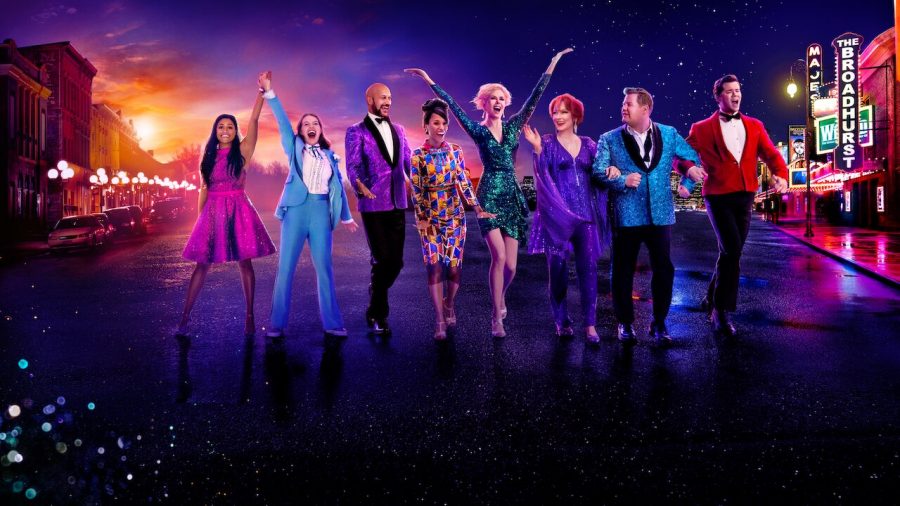Your donation will support the student journalists of The Tide, Richard Montgomery High School's student newspaper. Your contribution will allow us to purchase equipment and cover our annual website hosting costs.
‘The Prom’: the Netflix musical that unsatisfactorily satisfies
March 1, 2021
Ryan Murphy’s movie “The Prom,” glosses over the struggles and relationships of the queer community.
Following its success as a Broadway musical in 2018, The Prom was adapted into a film, directed by Ryan Murphy and released in December of 2020. It is available on Netflix and stars several large names in the film industry, including Meryl Streep, Nicole Kidman and James Corden.
The film and musical of the same name take place at James Madison High School in Indiana. The premise begins with the school prom being canceled by the PTA as a response to two female students wanting to attend the prom together. The notion of a queer romance between students Emma Nolan and Alyssa Greene causes conflict within their school system. The film simultaneously follows the story of Broadway stars Dee Dee Allen and Barry Glickman, who at the time are struggling and in need of something that will portray them in a positive and selfless manner. Dee Dee and Barry discover Emma and her dilemma through Twitter, which is where the two stories intersect.
This adaptation was received fairly well upon release, with positive reviews, and for good reason. With a pleasant and happy resolution, it is a feel-good film that doesn’t require much thought and reflection. Giving off a general sense of acceptance and comfort, this film is nice to watch as more of a filler. I didn’t feel satisfied by the movie’s picturesque ending, as I was expecting a movie that addressed such prominent issues to be more in-depth and thought-provoking. However, I do understand the appeal of looking for something that will make you feel hopeful and content in the moment.
As a film that touches on deeply personal subjects, it was inevitably going to be surrounded by controversy. The scenes and settings are very visually appealing and exciting, yet the resolution is substantially less moving and powerful.
For one, the relationship between Emma and Alyssa as well as the focus on coming out are not portrayed as accurately and as well as they could have been. While their relationship is dramatized and goes through several turns, it comes together in a picture-perfect way at the end. The film tells their story in a fairly in-depth way, but ultimately emphasizes the struggles they face too much and does too little to resolve the conflicts. The homophobia and cruelty the queer characters face will never fully disappear from our society, and the way in which it is suddenly overcome feels unrealistic and too lucky.
Despite these criticisms, The Prom does do its part in giving representation to the queer community and creating a platform that projects a message of inclusivity and positivity. The story focuses on several queer characters without making their inherent queerness the question of the movie. It shows characters that are confident in themselves and in their own identity, and only face the world outside them. It portrays the realistic struggle of LGTBQ people both closeted and out, yet doesn’t make the film one of sadness and deep internal conflict. Instead, it tells a queer story in which the characters are only restricted by those they cannot control, coming to a resolution where the characters can overcome these obstacles to their own happiness. It tells parallel stories, and illustrates how the queer struggle can be manifested in many different ways—as both adults who have found their place in life and teens still figuring it out.
The major point of controversy surrounding this film comes from James Corden and his portrayal of the gay character Barry Glickman. In casting the show, The Prom acquired a range of more well-known names, thus forgoing the representation of queer characters. This misses the entire point of the film, which centers around the idea of inclusivity and welcoming to the queer community. Instead, the film elected to have James Corden, a straight man, portray the role of a fairly stereotypical queer character.
Technically speaking, the film was satisfactory. I enjoyed the cinematic visuals and the acting, and I thought almost all of the dialogue felt natural and easy. It was a good film to watch for comfort, though it didn’t really address some of its featured issues. The music and choreography were exciting though not exceptional and generally made for a good experience to watch. The direction was fairly good and told the message in an effective and clear way.
The film, despite its controversy, does tell an important story and broadcasts an important message for the queer community. It allows for the younger generation to have hope in overcoming struggle. It promotes an idea of inclusivity and kindness, and overall cultivates a positive mindset. It may not be a perfect film, but it is enjoyable and a good movie to put aside some time to watch.
